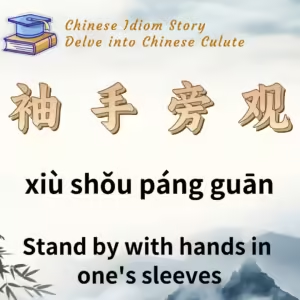
Chinese Idiom: 袖手旁观 (Xiu Shou Pang Guan)
English Translation: Stand by with hands in one’s sleeves
pīn yīn: xiù shǒu páng guān
Idiom Meaning: This idiom metaphorically describes a situation where one observes from the sidelines without intervening or participating in a matter, indicating indifference or detachment.
Historical Source: Essay on the Memorial for Liu Zihou by Han Yu (唐代韩愈《祭柳子厚文》)
Idiom Story:
The idiom “袖手旁观” originates from the life of Liu Zongyuan (柳宗元), a prominent writer during the Tang Dynasty. Liu, also known as Liu Zihou, was born in Hedong (modern-day Yongji, Shanxi). He became a jinshi at the age of 21 and later achieved the position of a member of the Ministry of Rites.
During his tenure as a government official, Liu Zongyuan was a key advocate for political reform alongside other scholars, including Wang Shuwen and Liu Yuxi. In 805 AD, they proposed a series of reforms aimed at curbing the power of eunuchs and local military strongmen. However, their initiatives faced fierce opposition and ultimately failed within just five months, leading to Liu’s exile to Yongzhou as a punishment.
After Liu Zongyuan’s death, the renowned literary figure Han Yu (韩愈), a friend of Liu, penned an essay to commemorate him. In this essay, Han expressed deep sympathy for Liu’s tragic fate and lamented the loss of such a talented individual who could not make a significant impact during his lifetime. He subtly criticized the indifference of those who had the skills to make a difference but chose not to act. He wrote: “不善为斫,血指汗颜;巧匠旁观,缩手袖间,” which translates to: “Those who are clumsy at woodworking sweat and bleed, while the skilled craftsman stands by with his hands tucked in his sleeves.”
This vivid imagery contrasted the active struggle of the unskilled with the inaction of the adept, who remained a mere observer. Over time, this phrase was shortened to “袖手旁观,” which now represents a passive stance of watching events unfold without getting involved or offering assistance, often viewed negatively as a lack of concern or responsibility.






